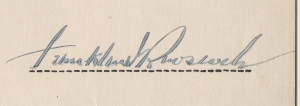|
FDR’s First Inaugural Address in the Midst of the Great Depression |
Click to enlarge:

Select an image:
“the only thing we have to fear is fear itself....”
President Franklin D. Roosevelt delivered his landmark first Inaugural Address at the U.S. Capitol, on March 4, 1933. Many consider the speech to be one of the greatest in American history. On the day of the inauguration, the country was at the lowest point of the worst depression in American history. The banks had closed in thirty-two of the forty-eight states (plus the District of Columbia), unemployment was above 25 percent, farms were failing, and two million people were homeless. The New York Federal Reserve Bank would not be able to open the very next day, as panicky customers had withdrawn huge sums in the previous days. In this context, Roosevelt set forth a positive message addressing the country’s greatest needs: relief, recovery, and reform. His confidence, optimism, and the massive amount of “New Deal” legislation he sent to Congress in the first one hundred days of his administration did much to reassure the American people that better times were on the way.
FRANKLIN D. ROOSEVELT.
First Inaugural Address, Typed Manuscript Signed, ca. May 1935, Washington, DC. 5 pp., 7 x 10½ in. Accompanied by Marguerite “Missy” LeHand, Typed Letter Signed, June 5, 1935, on White House stationery, returning the signed typescript to Mr. Barker.
Inventory #27122.99
Price: $135,000
Excerpts
“This is pre-eminently the time to speak the truth, the whole truth, frankly and boldly. Nor need we shrink from honestly facing conditions in our country today.... So first of all let me assert my firm belief that the only thing we have to fear is fear itself—nameless, unreasoning, unjustified terror which paralyzes needed efforts to convert retreat into advance….” (p1)
“This nation asks for action, and action now. Our greatest primary task is to put people to work. This is no unsolvable problem if we face it wisely and courageously.” (p2)
“In the field of world policy I would dedicate this nation to the policy of the good neighbor—the neighbor who resolutely respects himself and, because he does so, respects the rights of others—the neighbor who respects the sanctity of his agreements in and with a world of neighbors.” (p3)
“Our Constitution is so simple and practical that it is possible always to meet extraordinary needs by changes in emphasis and arrangement without loss of essential form.” (p4)
“We do not distrust the future of essential democracy. The people of the United States have not failed. In their need they have registered a mandate that they want direct, vigorous action. They have asked for discipline and direction under leadership. They have made me the present instrument of their wishes. In the spirit of the gift, I take it.
“In this dedication of a nation we humbly ask the blessing of God. May He protect each and every one of us. May He guide me in the days to come.” (p5)
Historical Background
In 1932, incumbent Republican President Herbert Hoover of Iowa sought re-election amid the Great Depression. Despite the poor economic conditions, Hoover had little opposition at the Republican National Convention in Chicago in June 1932 and won the nomination on the first ballot. The Democratic National Convention, also held in Chicago two weeks later, nominated New York Governor Franklin D. Roosevelt, who broke with tradition and delivered his acceptance speech at the convention, establishing a new precedent for future nominees.